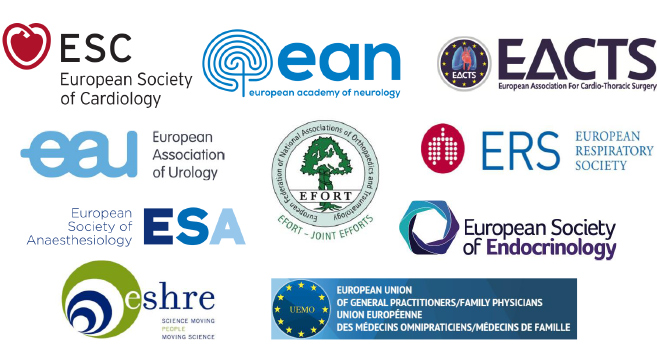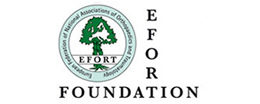
While the European Parliament (EP) prepares to vote upon the legislative proposal on health technology assessment (HTA)*, organisations representing tens of thousands of healthcare professionals who make daily use of health technologies unite in a call for a positive legislative outcome.
The European Society of Cardiology (ESC) together with the European Academy of Neurology (EAN), the European Association for Cardio-Thoracic Surgery (EACTS), the European Association of Urology (EAU), the European Federation of National associations of Orthopaedics and Traumatology (EFORT), the European Respiratory Society (ERS), the European Society of Anaesthesiology (ESA), the European Society of Endocrinology (ESE), the European Society of Human Reproduction and Embryology (ESHRE), and the European Union of General Practitioners (UEMO) strongly believe that a collaborative framework for the clinical assessment of health technologies is necessary to support high-quality healthcare in Europe. Only a robust system relying on best evidence, and built in the true EU spirit of equity, collaboration and transparency is suited to bring utmost added value to EU patients. This is why European doctors demand policymakers’ support for EU-level HTA without delay.
As healthcare professionals we see clear advantages in clinical HTA: a thorough understanding of the use, safety and clinical effectiveness of a technology is essential to evaluate what will bring true therapeutic added value to a patient. If such an exercise is performed in a robust manner as an EU collaboration, then time for decision-making will be shortened, scarce human resources will be used most efficiently, and early access to effective and safe innovative interventions will be enabled. This will support improvements in the quality of healthcare throughout the EU, without adding work for manufacturers as a collaborative HTA system will entail a single clinical assessment process.
We recognise that HTA collaboration is part of a complex process that requires a careful balance of national and EU competences. In our opinion, however, the European Parliament (EP) Environment, Public Health and Food Safety (ENVI) Committee report presents new solutions compared to the initial European Commission text. In particular, it has introduced sound compromises that will ensure that Member States retain control over their own decisions, for instance by allowing countries to perform complementary assessments where justified. Also, it preserves a clear and right distinction between joint clinical assessment work and reimbursement decisions, which should remain the sole responsibility of Member States.
In view of the above, and in recognition of the 10+ years of collaborative work and many millions of EU investment for the establishment of a sustainable European network on HTA**, we urge the EP Plenary to approve the EP ENVI report without modifications. Our experts are available to elaborate on the scientific basis for our support to EU-level HTA if helpful, and in view of achieving a framework which can bring real benefit in terms of improving patient outcomes across the EU.
*= Proposal for a regulation of the European Parliament and of the Council on health technology assessment and amending Directive 2011/24/EU
**= In 2004, the European Commission and Council of Minsters requested the establishment of a sustainable European network on HTA. This was initiated in 2005 with the EUnetHTA 1 project (2006-2008). Since then three Joint Actions (EUnetHTA JA) have been carried out: EUnetHTA 1 from 2010-2012 (budget EUR 6 million), and EUnetHTA 2 from 2012-2015 (budget EUR 9.5 million). EUnetHTA 3 (budget EUR 20 million) was launched in June 2016, and runs until 2020.
- Joint Statement in PDF version (PDF Document – 2 pages – 710kb)


